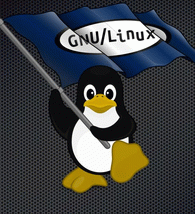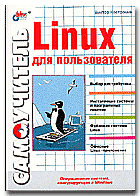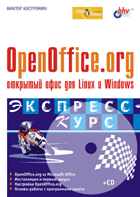Библиотека сайта rus-linux.net
Copyright ╘ 2003 Eric S. Raymond
This book and its on-line version are distributed under the terms of the Creative Commons Attribution-NoDerivs 1.0 license, with the additional proviso that the right to publish it on paper for sale or other for-profit use is reserved to Pearson Education, Inc. A reference copy of this license may be found at http://creativecommons.org/licenses/by-nd/1.0/legalcode.
AIX, AS/400, DB/2, OS/2, System/360, MVS, VM/CMS, and IBM PC are trademarks of IBM. Alpha, DEC, VAX, HP-UX, PDP, TOPS-10, TOPS-20, VMS, and VT-100 are trademarks of Compaq. Amiga and AmigaOS are trademarks of Amiga, Inc. Apple, Macintosh, MacOS, Newton, OpenDoc, and OpenStep are trademarks of Apple Computers, Inc. ClearCase is a trademark of Rational Software, Inc. Ethernet is a trademark of 3COM, Inc. Excel, MS-DOS, Microsoft Windows and PowerPoint are trademarks of Microsoft, Inc. Java. J2EE, JavaScript, NeWS, and Solaris are trademarks of Sun Microsystems. SPARC is a trademark of SPARC international. Informix is a trademark of Informix software. Itanium is a trademark of Intel. Linux is a trademark of Linus Torvalds. Netscape is a trademark of AOL. PDF and PostScript are trademarks of Adobe, Inc. UNIX is a trademark of The Open Group.
The photograph of Ken and Dennis in Chapter═2 appears courtesy of Bell Labs/Lucent Technologies.
The epigraph on the Portability chapter is from the Bell System Technical Journal, v57 #6 part 2 (July-Aug. 1978) pp. 2021-2048 and is reproduced with the permission of Bell Labs/Lucent Technologies.
| Revision History | ||
|---|---|---|
| Revision 0.95 | 5 August 2003 | esr |
| Proofreading complete. | ||
| Revision 0.94 | 31 July 2003 | esr |
| Incorporates proofreader fixes. | ||
| Revision 0.93 | 29 July 2003 | esr |
| More minor corrections and typo fixes. | ||
| Revision 0.92 | 21 July 2003 | esr |
| Minor corrections and typo fixes. | ||
| Revision 0.91 | 17 July 2003 | esr |
| Factual correction about VM/CMS; a bit more about C++. | ||
| Revision 0.91 | 14 July 2003 | esr |
| Reformat displays to fit 70-character width. | ||
| Revision 0.90 | 7 July 2003 | esr |
| Freeze for production. | ||
| Revision 0.87 | 30 June 2003 | esr |
| Kirk McKusick contributed a summation of the BSD lawsuit. | ||
| Revision 0.86 | 26 June 2003 | esr |
| Cleanup release. | ||
| Revision 0.85 | 24 June 2003 | esr |
| Review and cameos from Ken Thompson. | ||
| Revision 0.84 | 17 June 2003 | esr |
| Final stuff from Steve Johnson. Fold in 0.83 copy edits. | ||
| Revision 0.83 | 15 June 2003 | esr |
| Minor changes from work on Teaching Guide. Be systematic about compactness versus semi-compactness. | ||
| Revision 0.82 | 11 June 2003 | esr |
| Steve Johnson's contributions. | ||
| Revision 0.81 | 6 June 2003 | esr |
| Cross-reference and attribution markup fixes. | ||
| Revision 0.80 | 5 June 2003 | esr |
| Merged in Chapter 7-20 copy edits. | ||
| Revision 0.74 | 30 May 2003 | esr |
| Merged in Chapter 1-6 copy edits. | ||
| Revision 0.73 | 28 May 2003 | esr |
| Added discussion of Plan 9 in the Futures chapter. | ||
| Revision 0.72 | 26 May 2003 | esr |
| Minor fixes. | ||
| Revision 0.71 | 19 May 2003 | esr |
| Cathy is up to Chapter 5, Henry Spencer to Chapter 11. | ||
| Revision 0.70 | 17 May 2003 | esr |
| Two new diagrams in Contrasts and Complexity. Rob Landley's review pass is done. Contributions by Stuart Feldman and Mike Lesk. Bibliography has been consistency-checked. | ||
| Revision 0.67 | 12 May 2003 | esr |
| WWW is an example of New Jersey thinking applied to hypertext. Revisions to Languages chapter. | ||
| Revision 0.66 | 11 May 2003 | esr |
| Cameo quote from Brian Kernighan. Various minor corrections. | ||
| Revision 0.65 | 9 May 2003 | esr |
| New section on `Worse is Better' in the compexity chapter. Henry Spencer's review pass is up to Chapter 8. | ||
| Revision 0.64 | 8 May 2003 | esr |
| Folded in suggestions from Brian Kernighan. | ||
| Revision 0.63 | 7 May 2003 | esr |
| Typo fixes. Fold in Chapter 1 through 8 comments from Ken Arnold, | ||
| Revision 0.62 | 1 May 2003 | esr |
| Fold in Chapter 1 and 2 comments from Henry Spencer. | ||
| Revision 0.61 | 29 Apr 2003 | esr |
| Added reference for claim about DARPA valuing BSD open source in History chapter. Minor corrections to Complexity chapter. | ||
| Revision 0.60 | 28 Apr 2003 | esr |
| Regexp discussion moves to Minilanguages; Yacc and Lex moved to Tools. Added case study on statistical spam filtering. More on strategies for reducing latency in the Optimization chapter. | ||
| Revision 0.58 | 25 Apr 2003 | esr |
| End of second editing pass. | ||
| Revision 0.57 | 21 Apr 2003 | esr |
| Replaced httpget case study with blq. Folded in review comments and quotes by David Korn. | ||
| Revision 0.56 | 20 Apr 2003 | esr |
| Fold in Ken Arnold's comments. New section (inspired by Doug McIlroy) in the Modularity chapter, "Compactness and the strong single center". | ||
| Revision 0.55 | 17 Apr 2003 | esr |
| Slim down the Context section. Some corrections to C history from dmr. Quotes from Keith Packard and Jim Gettys. OpenOffice.org uses zip(1), not gzip(1). More on the Rule of Extensibility. | ||
| Revision 0.54 | 10 Apr 2003 | esr |
| Better description of common vs. def-ref linkage in C. Incorporated Doug McIlroy's second round of comments. Added case study of VM/CMS to Contrasts. | ||
| Revision 0.53 | 7 Apr 2003 | esr |
| Note on the Javs CLASSPATH problem. URLs are derivative of Unix filenames. Scotch an urban legend about C's ++. Added case study of Wily and more analysis to the Complexity chapter. | ||
| Revision 0.52 | 3 Apr 2003 | esr |
| Correction from Dennis Ritchie for the Portability epigraph. Various typo fixes. | ||
| Revision 0.51 | 2 Apr 2003 | esr |
| Dates and attributions for most of the epigraphs added. Typo fixes. | ||
| Revision 0.5 | 2 Apr 2003 | esr |
| New chapter on Complexity, after Interface; expands on and replaces the Tools chapter discussion of whether Emacs is an argument against the Unix philosophy. Fetchmail as a study in why pipelines aren't enough. SVr4 IPC is obsolete, but it turns out SVr4 shared memory is not. | ||
| Revision 0.46 | 30 Mar 2003 | esr |
| Folded in advice and quotes from Doug McIlroy. | ||
| Revision 0.45 | 18 Mar 2003 | esr |
| More typo fixes. Note that documentation-format problems are on their way to being solved at the user-presentation level by "everything is HTML, every reference is a URL". Substantially rewritten and expanded material on user environment variables. More on the implicit sociology of version-control systems. Chapters on Transparency and Multiprogramming swapped. | ||
| Revision 0.44 | 11 Mar 2003 | esr |
| More on multitasking in the Contrasts chapter. Many typo fixes. | ||
| Revision 0.43 | 6 Mar 2003 | esr |
| Added MVS case study to Contrasts chapter. "No junk, no confusion." in the Modularity chapter. New section on the pros and cons of compression in Textuality. | ||
| Revision 0.42 | 12 February 2003 | esr |
| Add fcntl/ioctl to things Unix got wrong. | ||
| Revision 0.41 | 11 February 2003 | esr |
| Corrections and additions to MacOS case study. A bit more about binary files as caches. Added cite of Butler Lampson. Additions to history chapter. Note in futures chapter about C and exceptions. Many typo fixes. | ||
| Revision 0.4 | 5 February 2003 | esr |
| Release for public review. | ||
| Revision 0.3 | 22 January 2003 | esr |
| First eighteen-chapter draft. Manuscript walkthrough at Chapter 12. Limited release for early reviewers. | ||
| Revision 0.2 | 2 January 2003 | esr |
| First manuscript walkthrough at Chapter 7. Released to Dmitry Kirsanov at AW production. | ||
| Revision 0.1 | 16 November 2002 | esr |
| First DocBook draft, fifteen chapters. Languages rewritten to incorporate lots of feedback. Transparency, Modularity, Multiprogramming, Configuration, Interfaces, Documentation, and Open Source chapters released. Shipped to Mark Taub at AW. | ||
| Revision 0.0 | 1999 | esr |
| Public HTML draft, first four chapters only. | ||
To Ken Thompson and Dennis Ritchie, because you inspired me.
Table of Contents
- Preface
- I. Context
- 1. Philosophy
- Culture? What Culture?
- The Durability of Unix
- The Case against Learning Unix Culture
- What Unix Gets Wrong
- What Unix Gets Right
- Basics of the Unix Philosophy
- Rule of Modularity: Write simple parts connected by clean interfaces.
- Rule of Clarity: Clarity is better than cleverness.
- Rule of Composition: Design programs to be connected with other programs.
- Rule of Separation: Separate policy from mechanism; separate interfaces from engines.
- Rule of Simplicity: Design for simplicity; add complexity only where you must.
- Rule of Parsimony: Write a big program only when it is clear by demonstration that nothing else will do.
- Rule of Transparency: Design for visibility to make inspection and debugging easier.
- Rule of Robustness: Robustness is the child of═transparency and simplicity.
- Rule of Representation: Fold knowledge into data, so═program logic can be stupid and robust.
- Rule of Least Surprise: In interface design, always do the═least surprising thing.
- Rule of Silence: When a program has nothing surprising to say, it should say nothing.
- Rule of Repair: Repair what you can — but when you must fail, fail noisily and as soon as possible.
- Rule of Economy: Programmer time is expensive; conserve it in preference to machine time.
- Rule of Generation: Avoid hand-hacking; write programs to write programs when you can.
- Rule of Optimization: Prototype before polishing. Get it working before you optimize it.
- Rule of Diversity: Distrust all claims for one true way.
- Rule of Extensibility: Design for the future, because it will be here sooner than you think.
- The Unix Philosophy in One Lesson
- Applying the Unix Philosophy
- Attitude Matters Too
- 2. History
- 3. Contrasts
- II. Design
- 4. Modularity
- 5. Textuality
- 6. Transparency
- 7. Multiprogramming
- 8. Minilanguages
- 9. Generation
- 10. Configuration
- 11. Interfaces
- Applying the Rule of Least Surprise
- History of Interface Design on Unix
- Evaluating Interface Designs
- Tradeoffs between CLI and Visual Interfaces
- Transparency, Expressiveness, and Configurability
- Unix Interface Design Patterns
- Applying Unix Interface-Design Patterns
- The Web Browser as a Universal Front End
- Silence Is Golden
- 12. Optimization
- 13. Complexity
- III. Implementation
- IV. Community
- 17. Portability
- 18. Documentation
- 19. Open Source
- 20. Futures
- Essence and Accident in Unix Tradition
- Plan 9: The Way the Future Was
- Problems in the Design of Unix
- A Unix File Is Just a Big Bag of Bytes
- Unix Support for GUIs Is Weak
- File Deletion Is Forever
- Unix Assumes a Static File System
- The Design of Job Control Was Badly Botched
- The Unix API Doesn't Use Exceptions
- ioctl2 and fcntl2 Are an Embarrassment
- The Unix Security Model May Be Too Primitive
- Unix Has Too Many Different Kinds of Names
- File Systems Might Be Considered Harmful
- Towards a Global Internet Address Space
- Problems in the Environment of Unix
- Problems in the Culture of Unix
- Reasons to Believe
- A. Glossary of Abbreviations
- B. References
- C. Contributors
- D. Rootless Root
- Editor's Introduction
- Master Foo and the Ten Thousand Lines
- Master Foo and the Script Kiddie
- Master Foo Discourses on the Two Paths
- Master Foo and the Methodologist
- Master Foo Discourses on the Graphical User Interface
- Master Foo and the Unix Zealot
- Master Foo Discourses on the Unix-Nature
- Master Foo and the End User
List of Figures
- 2.1. The PDP-7.
- 3.1. Schematic history of timesharing.
- 4.1. Qualitative plot of defect count and density vs. module size.
- 4.2. Caller/callee relationships in GIMP with a plugin loaded.
- 6.1. Screen shot of audacity.
- 6.2. Screen shot of kmail.
- 6.3. Main window of a Freeciv game.
- 8.1. Taxonomy of languages.
- 11.1. The xcalc GUI.
- 11.2. Screen shot of the original Rogue game.
- 11.3. The Xcdroast GUI.
- 11.4. Caller/callee relationships in a polyvalent program.
- 13.1. Sources and kinds of complexity.
- 18.1. Processing structural documents.
- 18.2. Present-day XML-DocBook toolchain.
- 18.3. Future XML-DocBook toolchain with FOP.
List of Tables
List of Examples
- 5.1. Password file example.
- 5.2. A .newsrc example.
- 5.3. A fortune file example.
- 5.4. Basic data for three planets in a record-jar format.
- 5.5. An XML example.
- 5.6. A .INI file example.
- 5.7. An SMTP session example.
- 5.8. A POP3 example session.
- 5.9. An IMAP session example.
- 6.1. An example fetchmail -v transcript.
- 6.2. An SNG Example.
- 7.1. The pic2graph pipeline.
- 8.1. Glade Hello, World.
- 8.2. A sample m4 macro.
- 8.3. A sample XSLT program.
- 8.4. Taxonomy of languages — the pic source.
- 8.5. Synthetic example of a fetchmailrc.
- 8.6. RSA implementation using dc.
- 9.1. Example of fetchmailrc syntax.
- 9.2. Python structure dump of a fetchmail configuration.
- 9.3. copy_instance metaclass code.
- 9.4. Calling context for copy_instance.
- 9.5. ascii usage screen.
- 9.6. Desired output format for the star table.
- 9.7. Master form of the star table.
- 10.1. A .netrc example.
- 10.2. X configuration example.
- 18.1. groff1 markup example.
- 18.2. man markup example.
- 19.1. tar archive maker production.






